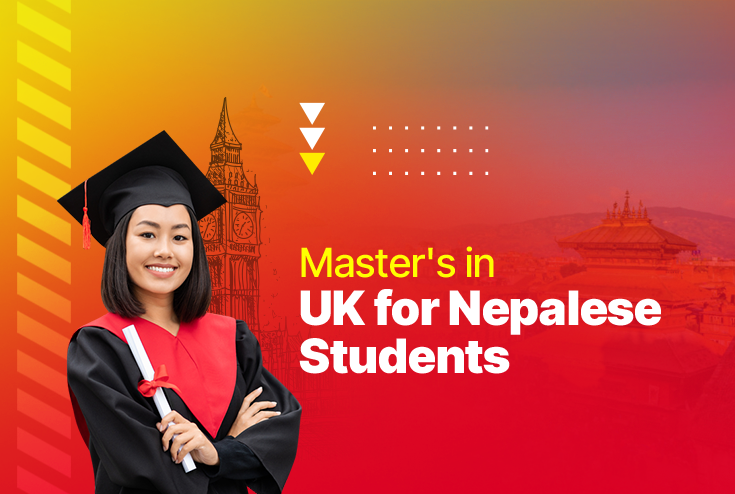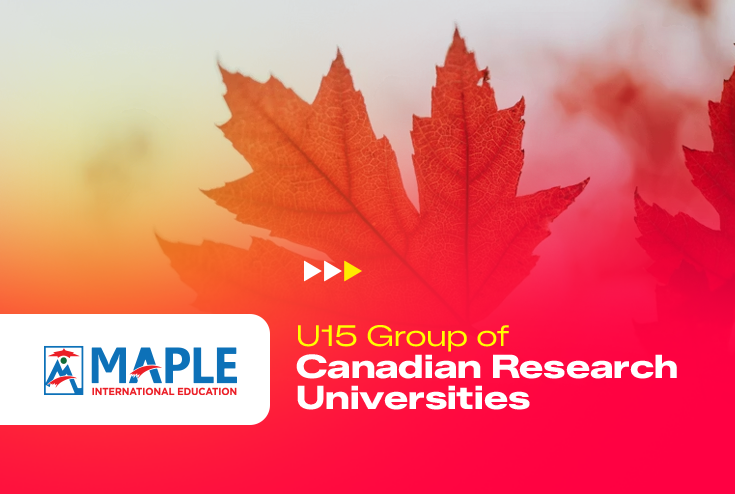
Master’s in UK for Nepalese Students - 2025 Guide
Studying in the UK has always been a top choice for Nepalese students due to the country’s academic excellence, global recognition, multicultural society, and generous post-study work opportunities. In this comprehensive guide, we will walk you through every essential aspect of pursuing a Master’s degree in the UK—from selecting the right university and course to managing finances, obtaining a visa, and starting your career.
Table of Contents
Why Study Master’s in the UK from Nepal?
Top UK Universities for Nepalese Students
Popular Master’s Programs for Nepalese Students in the UK
Admission Intakes in the UK
Admission Requirements for Master’s Degree in the UK
Academic Requirements
English Language Proficiency Requirements
Documents Checklist for UK Admission
Costs to Study Master’s in the UK for Nepalese Students
Tuition Fees
Living Expenses
UK Student Visa Costs
Pre-Departure & Miscellaneous Expenses
Bank Balance Requirement for Visa
Scholarship in UK for Nepali Students
Post-Study Work Opportunities in the UK for Nepali Students
Graduate Route Visa (Post-Study Work Visa)
Skilled Worker Visa (Tier 2 Work Visa)
Jobs in Demand in the UK (Shortage Occupation List)
Opportunities During Graduate Route Visa
Alternative Work/Stay Pathways
Conclusion
FAQs - Master’s in UK for Nepalese Students
Why Study Master’s in the UK from Nepal?
1. Globally Recognized Qualifications
UK degrees are highly respected worldwide. Top universities like Oxford, Cambridge, and Imperial College London frequently rank in the top 10 globally. This recognition can open doors to high-level career opportunities around the world.
2. Short Duration, High Value
Unlike many countries where a Master’s program takes two years, in the UK most postgraduate degrees are completed in one year, saving both time and cost.
3. Work Opportunities During and After Study
International students can work up to 20 hours per week during term time and full-time during vacations. Upon graduation, you’ll be eligible for a 18-months Graduate Route visa to stay and work in the UK.
4. Multicultural Environment
The UK is home to hundreds of thousands of international students, including thousands of Nepalese. You’ll enjoy exposure to diverse cultures, perspectives, and professional networks.
Top UK Universities for Nepalese Students
The United Kingdom is home to some of the world’s most prestigious universities, attracting thousands of international students every year. For Nepalese students planning to pursue a Master's degree in the UK, choosing the right university is one of the most important steps toward academic success and future career prospects. UK universities are globally ranked for their excellence in teaching, cutting-edge research, and international student support services.
Few of the universities that might be an ideal option for the Nepalese Students include:
Popular Master’s Programs for Nepalese Students in the UK
The UK offers a wide range of Master’s programs that attract Nepalese students every year such as Master’s degree in data science, AI, Business, Engineering, etc. These courses are not only globally recognized but also aligned with high-demand job sectors, allowing students to transition smoothly into post-study work or skilled migration.
Below is a breakdown of the most popular and career-focused Master’s degrees chosen by Nepali students in recent years:
1. MSc in Data Science / Artificial Intelligence
Why it's popular: With the rise of digitalization and analytics, Data Science and AI are among the highest-paying fields in the UK and globally.
What you’ll learn: Machine learning, big data, Python/R programming, data visualization, cloud systems, deep learning.
Top universities: University of Edinburgh, University of Manchester, UCL, University of Glasgow, Teesside University.
Career options: Data Scientist, AI Engineer, Business Analyst, Machine Learning Engineer.
Post-study advantage: These fields are on the UK’s Shortage Occupation List, improving PR prospects.
2. MBA (Master of Business Administration)
Why it's popular: Ideal for students with work experience seeking leadership roles or to start their own business.
What you’ll learn: Strategic management, leadership, finance, marketing, entrepreneurship, operations.
Top universities: University of Birmingham, Coventry University, University of West London, University of Leeds, Cardiff Metropolitan University.
Career options: Business Manager, Marketing Director, Startup Founder, Consultant.
Post-study advantage: MBAs from the UK are internationally recognized and open doors in global markets.
3. MSc in Public Health
Why it's popular: Students with pharmacy, nursing, or science backgrounds opt for this to enter the health policy or global healthcare sector.
What you’ll learn: Epidemiology, biostatistics, health systems, global health, research methods.
Top universities: University of Glasgow, University of Leeds, London School of Hygiene & Tropical Medicine, University of Greenwich.
Career options: Public Health Analyst, Health Program Coordinator, Researcher, NGO/INGO health roles.
Post-study advantage: Useful for applying to NHS roles or working in WHO-funded projects.
4. MSc in International Business / Global Management
Why it's popular: Offers a global perspective on modern business, appealing to students seeking international corporate careers.
What you’ll learn: Cross-border trade, international law, global marketing, cultural intelligence.
Top universities: University of Portsmouth, University of Greenwich, Coventry University, University of Manchester.
Career options: International Trade Manager, Supply Chain Manager, Global Strategy Analyst.
Post-study advantage: Prepares students for MNC careers or roles in global development agencies.
5. MSc in Engineering (Civil, Mechanical, Electrical, Software)
Why it's popular: Ideal for BE graduates seeking UK professional exposure and practical experience.
What you’ll learn: Core engineering skills + project management, sustainability, simulation tools.
Top universities: University of Manchester, University of Bristol, University of Sheffield, University of Hertfordshire.
Career options: Design Engineer, Project Manager, Structural Analyst, Robotics Engineer.
Post-study advantage: Engineering roles are in high demand in UK industries like infrastructure, construction, and energy.
6. MA in Education / TESOL (Teaching English to Speakers of Other Languages)
Why it's popular: Many Nepalese with B.Ed. or teaching experience pursue this for global teaching opportunities.
What you’ll learn: Educational leadership, pedagogy, second-language acquisition, curriculum design.
Top universities: University of East London, University of Derby, University of Nottingham, University of Sussex.
Career options: English Instructor, Curriculum Developer, Education Officer.
Post-study advantage: Eligible to teach in international schools or universities worldwide.
7. MSc in Nursing / Healthcare Management
Why it's popular: A natural choice for students with a Diploma or Bachelor in Nursing or Health Sciences.
What you’ll learn: Patient care systems, healthcare finance, hospital administration, ethics, clinical leadership.
Top universities: University of West London, University of Sunderland, University of Northampton.
Career options: Nurse Practitioner, Healthcare Administrator, Ward Manager, Clinical Supervisor.
Post-study advantage: Direct pathways to NHS roles and Skilled Worker visas.
8. MSc in Cybersecurity / IT Security
Why it's popular: Rising cybercrime and data breaches have created a huge demand for experts in cybersecurity.
What you’ll learn: Network security, ethical hacking, cyber law, risk management, digital forensics.
Top universities: University of Kent, University of South Wales, Northumbria University, Teesside University.
Career options: Cybersecurity Analyst, Penetration Tester, Information Security Officer.
Post-study advantage: Part of the UK's priority digital skills sector with job flexibility.
9. MSc in Environmental Science / Sustainability
Why it's popular: Suitable for students concerned with climate change, energy management, and environmental policies.
What you’ll learn: Environmental impact analysis, policy-making, renewable energy, sustainable design.
Top universities: University of East Anglia, University of Exeter, University of Leeds, University of Reading.
Career options: Environmental Consultant, Sustainability Manager, Climate Policy Analyst.
Post-study advantage: UK and EU organizations actively recruit sustainability graduates.
10. LLM (Master of Laws)
Why it's popular: Attracts students with a Bachelor of Law (LLB) or aspiring to work in international law.
What you’ll learn: Commercial law, human rights law, international trade law, legal writing, arbitration.
Top universities: Queen Mary University of London, University of Essex, University of Law, University of Glasgow.
Career options: Legal Advisor, Human Rights Advocate, Corporate Lawyer, Compliance Officer.
Post-study advantage: Adds international credibility for students planning legal careers abroad.
Admission Intakes in the UK
The UK offers three main intakes for Master’s programs:
Best Choice: September intake is ideal due to wide courses and universities availability and better funding options.
Admission Requirements for Master’s Degree in the UK
Before applying for a Master’s in the UK, Nepalese students need to fulfill specific academic, language, and documentation requirements. These requirements ensure that students are academically prepared, can communicate in English, and meet immigration rules. Below is a detailed breakdown to help you prepare a complete and successful application.
Academic Requirements
To study a Master’s degree in the UK, you must meet the university’s minimum academic criteria:
Bachelor’s Degree from a recognized university (3 or 4 years depending on the field).
Most UK universities require a minimum second division (60–65%) or a CGPA of 2.6–3.0+.
For highly competitive courses (e.g., MBA, Data Science), universities may ask for 70%+ or first division.
Some programs (e.g., MBA, Public Health) may also require 1–3 years of relevant work experience.
Academic backlogs should be minimal; some universities may accept up to 5–10 with justification.
If you have a low GPA, compensate with a strong SOP, work experience, and recommendation letters.
English Language Proficiency Requirements
Since all UK Master’s programs are taught in English, Nepalese students must prove their English proficiency through a standardized test:
Note: IELTS UKVI (Academic) is strongly recommended for visa purposes if you're unsure.
Documents Checklist for UK Admission
Here is a comprehensive checklist of documents needed to apply for a Master’s program in the UK:
1. Academic Documents
Mark sheets and certificates of SLC/SEE, +2 (HSEB), Bachelor’s Degree.
Transcript and Provisional/Degree Certificate.
Character certificates from +2 and Bachelor’s institutions.
2. English Language Proficiency Test Report
Valid IELTS / PTE / TOEFL / Duolingo score sheet.
Must be taken within 2 years of application date.
3. Statement of Purpose (SOP)
A compelling 1000–1500 word essay explaining:
Why this course and university?
Academic background and career goals.
Why study in the UK and not in Nepal or other countries?
4. Curriculum Vitae (CV/Resume)
Academic history, work experience, technical skills.
Clearly mention any internships, projects, or volunteer work.
5. Letters of Recommendation (LORs)
Typically two LORs required:
One academic (from a professor/lecturer).
One professional (from employer/supervisor), if applicable.
6. Passport
A clear copy of your valid passport bio page.
Passport should be valid for at least 6 months beyond your intended stay.
7. Work Experience Documents (if required)
Experience letter or job verification for programs like MBA or Public Health.
8. Certificates of Extra Courses or Training (if available)
Any relevant certifications like digital marketing, AI courses, or language proficiency.
9. Application Form
Complete online or downloadable form depending on the university.
10. Application Fee Payment Receipt
Many UK universities charge an application fee (£20–£100 depending on the university).
Costs to Study Master’s in the UK for Nepalese Students
Studying a Master’s degree in the UK is a valuable investment, but it requires proper financial planning. Nepalese students must consider tuition fees, living expenses, visa costs, and other charges before moving. Below is a complete breakdown of the cost structure to help you estimate your budget.
1. Tuition Fees
The average tuition fee for a master's degree in the UK ranges from £11,000 – £30,000 depending on the university, course type, and location. Below is the detailed breakdown:
2. Living Expenses
Living costs depend heavily on location, lifestyle, and accommodation type. For international students in the UK, it ranges from £8,000 – £15,000.
3. UK Student Visa Costs
4. Pre-Departure & Miscellaneous Expenses
5. Bank Balance Requirement for Visa
To get a UK student visa, you must show proof of financial capacity.
Example: If your tuition is £13,000 and you study in Birmingham, you must show £13,000 + £10,224 = £23,224 in your or your sponsor’s bank account for 28 consecutive days.
Scholarship in UK for Nepali Students
Studying in the UK can be expensive, but numerous scholarships and financial aid options are available to help Nepalese students fund their Master’s degree. These scholarships are offered by the UK government, universities, and private institutions, based on academic excellence, leadership potential, financial need, and subject relevance.
Some of the most popular scholarship opportunities for international students, including Nepalese students are listed below:
Chevening Scholarships – Fully funded UK government scholarships covering tuition, living expenses, and flights, awarded to outstanding individuals with leadership potential and two years of work experience.
Commonwealth Master’s Scholarships – Fully funded by the UK government for students from developing Commonwealth countries (including Nepal) pursuing development-related courses.
GREAT Scholarships – Jointly funded by the British Council and UK universities, offering £10,000 towards tuition fees for academically strong students from Nepal.
University-Specific Scholarships – Many UK universities (e.g., University of Glasgow, Leeds, UEA, Coventry) offer automatic or application-based scholarships ranging from £1,000 to full tuition waivers based on merit or financial need.
Post-Study Work Opportunities in the UK for Nepali Students
One of the top reasons Nepali students choose the UK for their Master’s degree is the strong post-study work opportunities it offers. From the Graduate Route visa to full-time skilled jobs, the UK provides clear pathways for international students to gain work experience, earn income, and even transition to long-term settlement.
1. Graduate Route Visa (Post-Study Work Visa)
A 18-months work visa (3 years for PhD graduates) that allows international students to stay and work in the UK after completing their degree.
Who is eligible?
Any international student who successfully completes a UK degree (Bachelor’s, Master’s, or PhD) from a licensed sponsor.
What kind of work is allowed?
You can work full-time at any skill level, for any employer, or be self-employed. No job sponsorship is required.
Duration:
18 months for Bachelor’s / Master’s graduates
3 years for PhD graduates
Application Fee: £880 + £1,035/year Immigration Health Surcharge (IHS)
Benefit: No employer sponsorship needed, making it easier to gain UK job experience right after graduation.
2. Skilled Worker Visa (Tier 2 Work Visa)
A long-term work visa for international graduates who are offered a job by a UK-licensed employer.
Eligibility Criteria:
Job offer in an eligible skilled occupation
Minimum salary of £26,200/year or £10.75/hour (may vary by sector)
English language proficiency
Employer sponsorship
Duration: Up to 5 years (renewable); counts toward UK permanent residency (ILR)
In-demand sectors include IT, Healthcare, Engineering, Education, and Construction — making it easier for Nepali students in these fields to transition from Graduate Route to Skilled Worker.
3. Jobs in Demand in the UK (Shortage Occupation List)
Nepali students pursuing Master’s degrees in the following fields have higher employability:
Students in these fields may get faster visa approvals, lower salary thresholds, and better sponsorship options.
4. Opportunities During Graduate Route Visa
During your 18-months post-study visa, you can:
Work full-time in any job or industry
Switch to Skilled Worker visa if you get a qualifying job
Apply for other routes (Start-up visa, Global Talent visa, etc.)
Enroll in short courses or professional certifications
Gain UK work experience to enhance global job applications
Tip: Use this period to build your UK CV, network with employers, and attend job fairs hosted by universities.
5. Alternative Work/Stay Pathways
Start-up / Innovator Visa – For students with a business idea endorsed by a UK body
Global Talent Visa – For graduates with outstanding achievements in academia, research, or tech
Health and Care Worker Visa – Fast-tracked route for nurses, caregivers, and allied health professionals
Conclusion
Pursuing a Master’s degree in the UK offers Nepali students a life-changing academic and career experience. With world-class universities, globally recognized qualifications, generous scholarships, and clear post-study work options, the UK remains one of the best destinations for higher education. While the journey involves financial planning, preparation, and meeting specific admission requirements, the rewards: both personal and professional are immense. From academic excellence to global career growth, the UK empowers Nepali students to achieve their dreams.
Contact us now to become a part of an international community of changemakers!
FAQs - Master’s in UK for Nepalese Students
1. Is a UK Master’s degree valid in Nepal?
Yes, a UK Master’s degree is fully recognized and valid in Nepal for both public service exams and private sector jobs, as long as it’s from a recognized UK university.
2. How much money is required to study in the UK for Nepali students?
On average, a Nepali student needs £22,000–£36,000 (approx. NPR 37–60+ lakhs) to cover tuition, living costs, visa, and travel for a 1-year Master’s program.
3. What is the minimum GPA for the UK from Nepal?
Most UK universities require a minimum GPA of 2.6 to 3.0 or 60–65% in your Bachelor’s degree; top universities may require higher scores.
4. Who is eligible for Master’s in the UK?
Nepali students with a Bachelor’s degree (3–4 years), a valid English proficiency test score (IELTS/PTE/TOEFL), and required documents (SOP, LOR, transcripts) are eligible.
5. Is IELTS required for UK Master’s?
Yes, most UK universities require IELTS (usually 6.0 to 6.5), though some may accept PTE, TOEFL, Duolingo, or waive it with MOI (Medium of Instruction) for admission—but not for the visa.
6. Can I work during my Master’s in the UK?
Yes, international students on a UK Student Visa can legally work up to 20 hours per week during term time and full-time during vacations.
Also Read:
Study in UK from Nepal: A Guide 2025
Masters by Research in UK for Nepalese Students
Cost to Study in UK from Nepal: A Guide 2025




